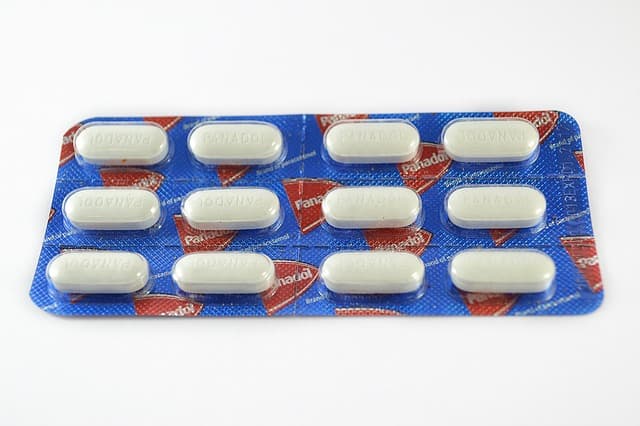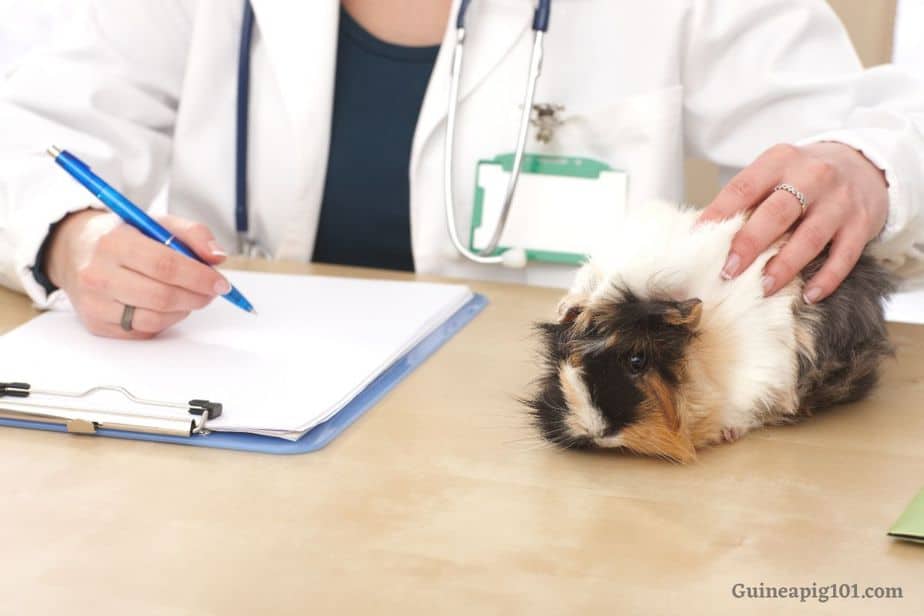Most animals, including your guinea pigs, can’t tell you verbally that they are in pain, So it can be difficult for you to understand the same. However, as a guinea pig owner, you must look out for any signs of discomfort in your guinea pigs.
Prolonged experience of pain can lead to poor quality of life in guinea pigs. But what can you give a guinea pig for pain? Let’s find out!
Pain in guinea pigs can be treated naturally or medically, depending on the cause of the pain. NSAIDs are used for chronic pain, while Mild Narcotics and Local anesthetics are used for minor surgeries and pre-post surgery pain. Natural Pain treatment is used for gastrointestinal disorders, arthritis, etc.
Pain is a sign of underlying medical issues in guinea pigs. Guinea pigs do a great job of hiding any illness and pain that makes the treatment a challenge.
You must visit an experienced vet so that they can go ahead and identify the pain, make an accurate diagnosis, and treat the pain accordingly.
How do I know if my guinea pig is in pain?
Guinea pigs do a great job of hiding their pain, and it may take several days before the physical signs of pain starts showing up.
So how would you know if your guinea pig is in pain? The key here is to look out for behavioral changes in guinea pigs.
Here are a few signs you need to look out for:
- Reluctant to move or walk
- Increased hiding around the cage
- Loud tooth grinding. ( The sound is different from chattering, a slow steady sounds of molars)
- Hunched posture with a rough coat. (Causes by bloating or stomach pain)
- Change in a walking pattern. (a sign of lymph or joint pain)
- Shivers around the body.
- Scratching or licking the affected area.
- Change in water intake and food intake
- Heavy or rapid breathing
- Shows aggression when trying to pet or handled
- Lying stretched out for long intervals. ( caused by sore feet)
- Unable to eat properly. (caused by dental pain)
- Loss of curiosity
- Rough and untidy coat. (unable to self-groom)
- A high pitched squeal or screech. (a sign of severe pain)
When a guinea pig is ill, they will be lethargic, not willing to eat or make any sound, pull its body tight, lie around in hidings, and may even blink their eyes repeatedly.
When a guinea pig is healthy, they remain active, curious, eat their regular diet and groom themselves several times a day.
You can quickly tell the difference between a healthy and ill guinea pig. Make sure you lookout for the signs carefully.
How to treat pain in guinea pigs?
Many types of treatment can be given to your guinea pigs depending upon the kind of pain.
While a mild discomfort from gas, digestive disorder, etc. can be treated by natural method.
Other severe pain due to arthritis, pre-post surgery pain, dental pain, etc. requires prescribed drugs or a combination of medications for proper relief.
Guinea pigs perceive pain, just like we humans do. Therefore if we don’t provide adequate care and aid to our guinea pigs during mild pain, then it may have serious consequences.
Some of the most common causes of pain in guinea pigs include:
- dental problems
- Gastrointestinal pain
- Arthritis or lymph pain
- Trauma &
- Surgical interventions
According to a study, drugs such as Aspirin can be used to treat mild-moderate pain. If your guinea pig is in severe pain and needs to be hospitalized for intensive care, then your vet may prescribe a combination of medicines for reducing the pain and anxiety in your guinea pigs.
Studies prove that Buprenorphine is a type of opioid medication that is used by most vets for relieving chronic pain during or after a surgical procedure.
Please keep in mind that you should never provide any drug to your guinea pig for pain relief.
It is best to consult a vet and get properly prescribed medicine as the vet will be able to provide the right dosage and medication as per the cause.
Can you give guinea pigs pain medicine?

We provide you with such information to better understand your guinea pigs. Under no circumstances, the information should be treated as medical advice.
All the medicines and treatment recommended in this article is for informational purpose only.
You should visit a professional Vet immediately if your guinea pigs show any signs of distress and only use the medicines prescribed by your vet.
It is always recommended to visit a qualified vet for any kind of pain medication for your guinea pigs.
Your vet will diagnose your guinea pigs accurately and prescribe the appropriate remedy for them.
A veterinarian checkup will also ensure that the underlying health issue that is causing the pain is also treated well.
However, here is a small list of drugs that are prescribed for pain relief by most vets.
Non-Steroidal Anti-inflammatory Drugs (NSAIDs) For Guinea Pigs

Some of the most common NSAIDs recommended by vets for pain relief in guinea pigs include:
- Meloxicam (Most commonly used)
- Aspirin (For mild pain: avoid post-surgery)
- Carprofen (only when prescribed: Can result in weight loss)
- Flunixin meglumine (for joint and lymph pain)
- Ibuprofen (effective for symptoms of scurvy and similar conditions)
These are some of the most common medicines prescribed by the vet to deal with pain, inflammation & swelling in guinea pigs.
NSAIDs mentioned above are some of the most common pain-relieving drugs for our guinea pigs.
However, it is recommended to consult a vet before you dose your guinea pigs with any of the medication.
These drugs have anti-inflammatory and pain-relieving properties, so they are often chosen for mild to moderate pain relief in guinea pigs.
These drugs can be either given orally or through an injection. Your vet will be able to tell you more about the dosage and how long you should use the same depending upon the cause of the pain.
Please note that the longterm use of NSAIDs can be harmful to our guinea pigs. You might need to visit a vet for re-examination to change the dose or stopping the use of medication.
Narcotics
Narcotics are a diverse group of opioid drug that is used for severe pain relief.
It is mostly prescribed pre-post surgery, bone pain, and other acute pain in guinea pigs. These drugs are either given orally or via injections. Most opioids are regulated by the FDA and are hardly prescribed for home use.
Vets use this under certain circumstances only. Medetomidine, Midazolam, Fentanyl are some of the most commonly used opioid drugs for guinea pigs.
Do remember that these drugs are for short-term use only.
Local Anesthetics

Local Anesthetics are used for minor surgeries and treatment in guinea pigs. Vets usually use these for minor skin procedures, removal of tumors under the skin, etc.
These are mostly given in the form of oral medication, topical cream, or injection into the skin.
A local anesthetic is not used for pain relief in the longterm as the duration of its action is short.
Epidural Anesthesia
According to studies, epidural anesthesia is used for some medical procedures by the vets.
It is directly injected in the spinal fluids that make a particular area of the body numb. It is mostly used to reduce pre-post surgery pains in guinea pigs.
Usually, it is used for major surgeries like abdominal surgical procedures, such as GI surgery, etc.
The effect of epidural anesthesia only lasts for a few hours, and professional vets only use this anesthesia for major surgeries.
Pain medication for guinea pigs
| Name of medicine | Dosage(per kg of body weight) | Instruction | Important Note |
|---|---|---|---|
| Aspirin | 50-100 mg/kg, give PO | Orally 1-2 times a day | Avoid pre-post surgery as it thins the blood. |
| Buprenorphine | 0.05 mg/kg | Injection | Effect lasts for 8-12 hours. Used mostly for surgery procedures. |
| Butorphanol | 2 mg/kg | Injection | Effect lasts for 2-3 hours. Used mostly for surgery procedures. |
| Carprofen | 4 mg/kg | Orally 2 times a day | Effective for 12-24 hours |
| Flunixin | 2.5-5 mg/kg | Orally or via injection | Effective for 12-24 hours |
| Flurbiprofen | 1 drop | topically 1-2 times a day | Apply only on nose and eyes |
| Hydromorphone | 2 mg/kg | Injection | For moderate-severe pain |
| Ibuprofen | 10 mg/kg | Orally 1-3 times a day | May cause bloating |
| Ketoprofen | 1.5mg/kg | Injected 1-2 times a day | Effective for 24 hours Will interact with diuretics and aspirin |
| Meloxicam | 0.2-0.4 mg/kg(dependng upon severity of pain) | Orally or via injection | Effective for 12 to 24 hours. Avoid if your guinea pig have kidney or bladder problems. |
| Morphin | 2-5 mg/kg | Injection | Effective only for 2-3 hours. |
| Oxymorphone | 0.2-0.5 mg/kg | Injection | Used as a pre-anesthetic. |
| Paracetamol | 100 mg/kg | Orally | Can cause gastrointestinal (GI) side-effects |
| Piroxicam | 0.3 mg/kg | Orally | Can have few adverse effect |
| Tramadol | 5-10 mg/kg | Orally – every 8 to 12 hours | For moderate-severe pain in guinea pigs. high dosage can induce sleepiness in guinea pigs |
Natural pain relief for guinea pigs
Natural pain relief methods are not effective on their own. However, when combined with proper medication it can make your guinea pigs feel better and help in quick recovery as well.
Some of the most commonly used natural pain relief are:
Comfortable living space

Providing a comfortable and relaxed living space to your rabbit can help in quick recovery while making them feel safe.
Illness followed by pain is one of the significant factors that lead to severe stress in your guinea pigs.
The vet visit is even more stressful as they need to travel in a carrier, be in an open and new environment, which makes them feel vulnerable.
Thus they will need a comfortable and relaxed living space to feel safe and secure.
Make sure you clean your cage thoroughly and lie fresh bedding topped up with some food and water.
Also, ensure your guinea pigs have a couple of hiding space in the cage.
It is recommended to use a divider in the cage if you feel other guinea pigs could be disturbing your sick piggy.
Apart from the cage set up, there are few environmental factors that you need to keep in mind. Here are a few things you should keep a note of:
- Speak in a soft voice and remove any noisy things from the cage areas(Speakers, Television, etc)
- Make sure the living environment is clean and free from dust, kitchen fumes, etc.
- Provide a couple of hiding spaces around the cage
- If you have other pets in your home including a rabbit, dog or cat make sure you keep them away.
- Provide them with good quality hay, pellets, vegetables, and critical care if needed. (separate the food from other guinea pigs as a sick piggy will eat slowly)
Acupuncture
Acupuncture is a form of traditional treatment that has its roots back from 1000’s of years.
Many types of diseases can be cured with the proper practice of acupuncture.
It is as effective on small pets like guinea pigs as it is on human beings. However, there are only certain medical situations when you will be able to use this technique.
This technique works great while you are caring for elderly guinea pigs that have pain in their body due to arthritis, stiff legs, joint pains, etc.
Acupressure Massage
Acupressure massage is another excellent technique for reducing pain in guinea pigs.
It is useful for some mild pains due to bloating, gastrointestinal disorders, and other similar diseases.
You can simply start with a gentle side-to-side massage on the belly and the back.
All the above data are for informational purposes only and you should never try to treat your guinea pigs without proper vet assistance.
What happens if you leave a guinea pig in pain?
If mild-moderate pain in guinea pigs is not given any attention on time, then it can be life-threatening for your guinea pigs.
Please note that in most cases, the pain is not the primary problem, but the illness that is causing the pain is.
When a guinea pig experience pain for an extended period, then they may develop more complication that includes:
- Gastrointestinal problems
- Kidney or bladder damage
- A sudden change in body temperature
- Organ failure
- Death in some cases
Thus, you must always take things seriously and identify the change in behavior and explain everything to the vet adequately so that they can give proper treatment to your guinea pigs.
In most cases, it is seen that the negligence of mild discomfort in guinea pigs has led to severe health issues at some time.
Thus, make sure your guinea pig is given proper and attention if they show any signs of distress.
FAQ
How much Metacam should I give my guinea pig?
The recommended dose of Metacam for a guinea pig is 0.2 mg/kg of weight.
Can guinea pigs have paracetamol?
Yes, guinea pigs can have Infant Calpol. The recommended dosage is 0.2ml.
Is enrofloxacin safe for guinea pigs?
Yes, studies show that enrofloxacin is entirely safe for our guinea pigs.
